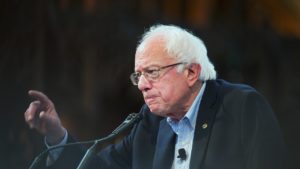Democrat Politics
Bernie Sanders Almost Matches Hillary Clinton's Fund-Raising
Sanders is the first candidate to announce he surpassed 1 million individual online contributions—a milestone he reached earlier in the campaign cycle than President Obama did in both 2008 and 2012. It took Obama until February to reach 1 million donations the first time around, and October the second, according to The Washington Post.
As with Obama, many of Sanders’s donations have been from people contributing small amounts. The campaign said the average donation over the last week was just less than $25. In the last quarter, the campaign said that the average donation was $34.
For her part, Clinton’s campaign said Wednesday that 93 percent of its donations since July were $100 or less. Her campaign expects to meet their goal of $100 million by the end of the year. Sanders, it seems, will be huffing and puffing in her ear the whole way there.
Candidates Eating Food . . . at Least Once
By Robyn Beck/AFP/Getty Images.
HILLARY CLINTON AND ICE CREAM Here is an image of Hillary Clinton consuming frozen cow’s milk from a small container. Unreal.
5 Shockingly Relatable Hillary Clinton E-mails Emerge in Latest Cache
Has she tried to keep her normality hidden on a secret server in Chappaqua all these years?
Read MoreEmily Blunt Stole Her Most Vicious Devil Wears Prada Insult From an Awful Mom She Overheard
It’s been nine years since The Devil Wears Prada swept movie audiences into its swirl of deliciously bitchy fashion politics. Since then, there have been some mini-reunions between the comedy’s stars—Meryl Streep terrorized Emily Blunt again in Into the Woods, and Anne Hathaway and Blunt formed something of a book club earlier this month. And while the Runway triumvirate has refused to make the sequel we’ve been yearning for, Blunt did offer up a bit of Devil Wears Prada trivia on Wednesday.
While talking about channeling her bitchy co-assistant character on Howard Stern’s Sirius XM program, the British actress revealed that she actually pulled one of the character’s most cutting lines from a real person.
“I like to soak up people on the street,” Blunt said about her acting process. “I guess I steal from people I meet. Like, I saw a mother speaking to her child in a supermarket when we were shooting that film. And it’s a line that gets quoted back to me now. She yelled at her kid and she kind of opened and closed her hand and she goes [in harsh American accent], ‘Yeah, I’m hearing this, and I want to hear this.’ I went and put it in a movie, when Anne Hathaway is kind of talking to me, and I just told her that [to make her shut up].”
If you don’t remember the line, here it is:
[embedded content]
Blunt continued by explaining how real-life people inspire her performances: “For me, that’s what helps me . . . to feel what other people would feel in my skin. And other times I feel like it is the ultimate expression of empathy, to be so interested in people and empathize with them profoundly.”
Is it too much to hope that the Sicario star sees another awful mom chiding her children in public, so Blunt feels inspired enough to revisit her Devil Wears Prada character? Blunt has said that if Streep were on board, she would consider participating in a sequel: “I think I would do it,” she said. Both Streep and Blunt have one hesitation, however, about revisiting the fashion world for a movie. “We all were told to go on these skinny diets for the first time,” Blunt has said. “But I’d be up for it.”
Portraits from the 2015 Toronto International Film Festival
Photograph by Justin Bishop.
Elizabeth Olsen, I Saw the Light


